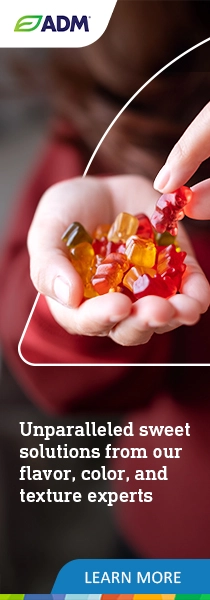
- Industry news
Industry news
- Category news
Category news
- Reports
- Key trends
- Multimedia
- Journal
- Events
- Suppliers
- Home
- Industry news
Industry news
- Category news
Category news
- Reports
- Key trends
- Multimedia
- Events
- Suppliers
ADM report: Functional beverages and low-alcohol options soar as Gen Z prioritizes health
15 Aug 2024 --- Gen-Z and Millennial consumers are progressively opting for a “holistic and proactive” lifestyle, with ready-to-drink (RTD) and carbonated soft drink (CSD) categories surging in popularity among these demographics, according to ADM’s 2024 Beverage Innovation Report.
The key findings on consumer preferences within the functional non-alcoholic and alcoholic drink sectors indicate that 67% of Millennials and 56% of Gen Z are increasingly consuming RTD alcoholic beverages in Europe to experience new flavors.
In North America, 76% of Millennials and 63% of Gen Z consumers show similar tendencies.
Gen Z drives innovation
ADM notes that Gen Z has a strong impact on beverage trends as they reach the legal drinking age and hold purchasing power. The generation is also “overwhelmingly focused” on sustainable wellness, with over 71% stating a commitment to preventive health.

Other generations, such as Baby Boomers and Gen X, are also proactive about prioritizing health but fall behind Gen Z statistically.
Health and wellness trends coincide with a reduced consumption of alcohol globally, with 49% of Gen Z and 56% of Millennials adopting sober lifestyles. This has led to a proliferation of alcohol-free or low-alcohol drink options as innovation in traditional cocktails and beer categories increases.
The rise of functional beverages
Consumers in this category actively seek hydration, energy, better cognitive function, and gut health from non-alcoholic beverages for a more active lifestyle. Sports nutrition, in particular, has opened up to welcome athletes and individuals seeking active nutrition.
The report indicates a drastic spike in CSDs that claim to better digestive health claims, growing 141% in revenue from 2022-2023.
Innovation in this category has expanded into non-traditional spaces, with a focus on probiotics or prebiotics, proteins and electrolytes in water and juices. Citrus and fruity flavors such as Coconut, Triple Berry, Strawberry Vanilla, Lychee, Strawberry Kiwi, and Dragonfruit dominate, as consumers prefer beverages with a “calming and relaxing” effect.
.jpg) Quality and convenience go hand-in-hand with consumers prioritizing high-quality spirits in the RTD segment (Image credit: ADM).Flavors inspired by alcohol remain an interest for health-minded consumers in this category.
Quality and convenience go hand-in-hand with consumers prioritizing high-quality spirits in the RTD segment (Image credit: ADM).Flavors inspired by alcohol remain an interest for health-minded consumers in this category.
Despite contention around their impact on health, energy drinks sales are up with an estimated market value of US$24 billion in 2023. ADM notes that male Millennials are among the biggest consumers of energy drinks as the category continues to innovate with flavors.
Sports and active nutrition drinks are in demand for their functional benefits, such as added vitamins and protein, weight management claims and cognitive and digestive improvement. As manufacturers integrate electrolytes into other beverage categories, consumers no longer seek sports drinks for hydration alone.
Alcoholic beverage trends
The COVID-19 pandemic has led to a rise in the at-home bar concept. This has spurred mocktail and cocktail kits and flavor innovation in alcoholic and non-alcoholic categories.
Consumers looking for convenience increasingly turn to the RTD segment to enjoy pre-mixed beverages. ADM’s data indicates that both Millennials (65%) and legal drinking age Gen Z consumers (58%) lean toward “better-for-me” options as low- or reduced-sugar RTD beverages remain popular content among 60% of Millennials and 56% of Gen Z.
Quality and convenience go hand-in-hand with consumers prioritizing high-quality spirits in the RTD segment, spurring innovation in wine- and malt-based versions. Classic cocktails, including margaritas and mojitos, remain popular, while spicy, botanical and fresh fruit notes drive top RTD trends.
Cocktail and mocktail manufacturers are also focused on health in alcoholic beverages and are launching low-calorie, low-carb, low-sugar and low-alcohol options for wellness-minded consumers. The findings show 27% of Gen Z and 36% of Millennials say they drink hard spirits at least once a week, with many US and Canadian Gen Z consumers stating they have not had alcohol in the past six months.
ADM notes that the beer market is swelling even as Gen Z records reduced consumption. Flavored beer offers businesses opportunities to attract traditional beer-drinking consumers.
The report cites supporting data that 63% of Millennials and 57% of Gen Z find a Margarita-flavored beer appealing, with most going to bars and restaurants to enjoy a pint.
Across the flavored beer segment, Millennials find claims like “natural flavors” (69%), “new flavor options” (69%) and “contains real fruit juice” (66%) inviting. Some 52% drink beer at least once a week, and 39% find it “fits their lifestyle.”












